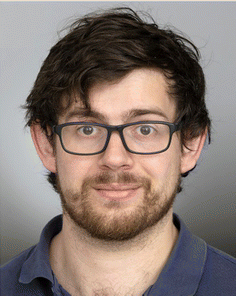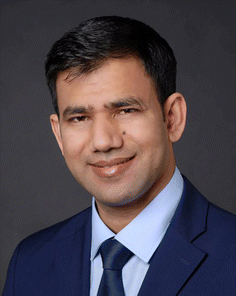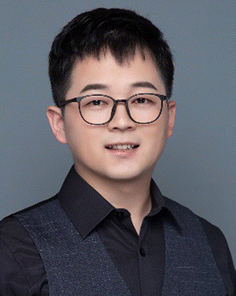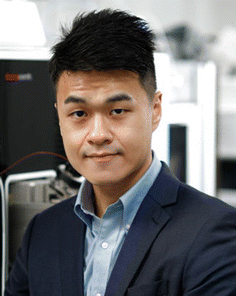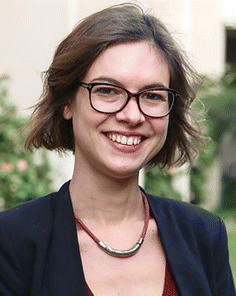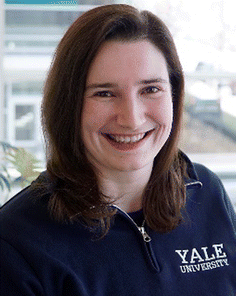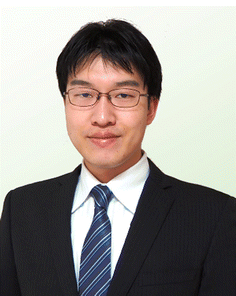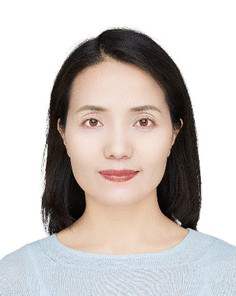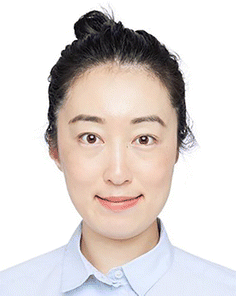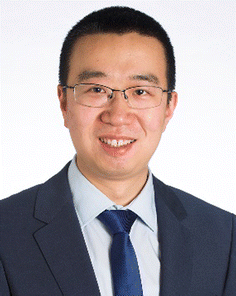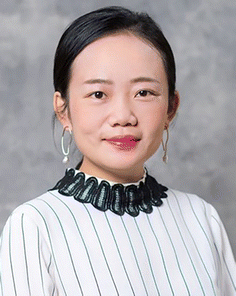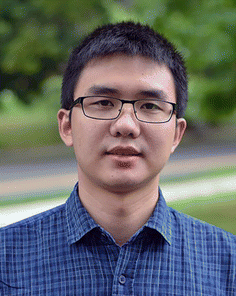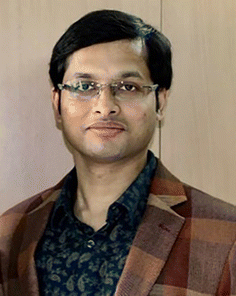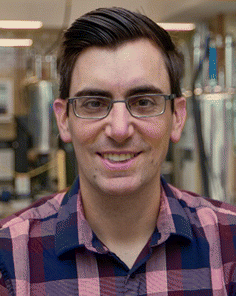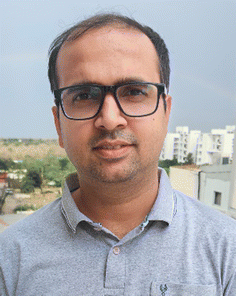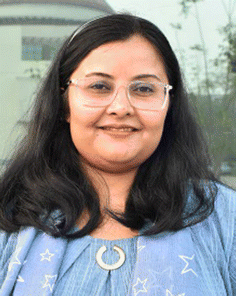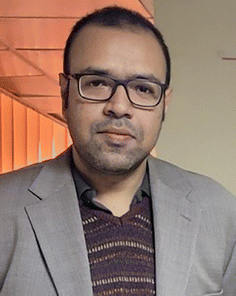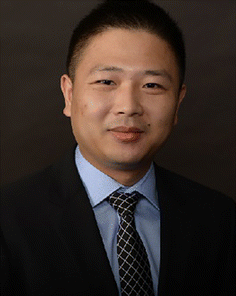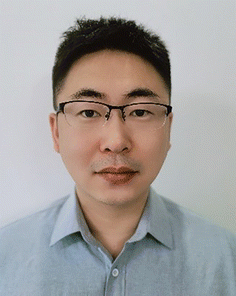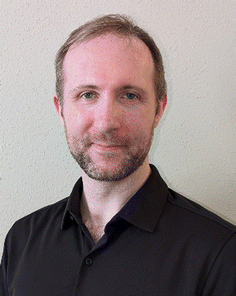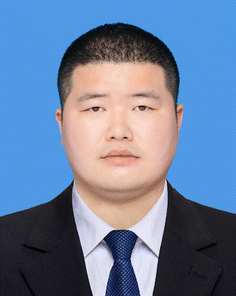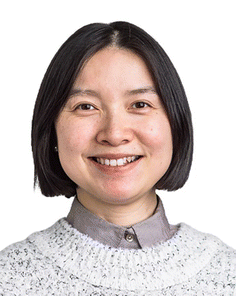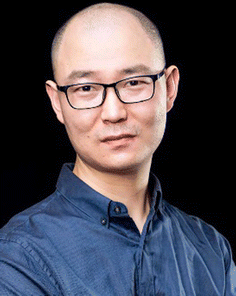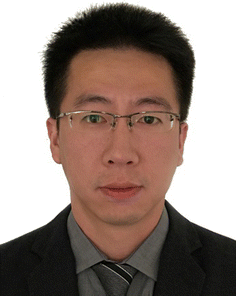DOI:
10.1039/D4CC90229G
(Profile)
Chem. Commun., 2024,
60, 7391-7396
Contributors to the Emerging Investigators collection 2024: Part 1
Dr Cameron L. Bentley obtained his PhD from Monash University, Australia and worked as a (senior) research fellow at the University of Warwick, UK, supported by subsequent Endeavour, Marie Skłodowska-Curie and Ramsay Memorial Fellowships. Currently, he is a lecturer and ARC DECRA Fellow at Monash University and his research centres on combining cutting-edge electrochemical imaging techniques with co-located microscopy/spectroscopy to solve contemporary structure–function problems in electromaterials science. Cameron has published >60 peer-reviewed articles and was the recipient of the 2020 Early Career Analytical Electrochemistry Prize of ISE Division 1 and the 2023 Alan M. Bond Medal.
Pankaj Chauhan obtained his PhD from Guru Nanak Dev University, India in 2012. In April 2013, he joined the research group of Professor Dieter Enders as a postdoctoral researcher at RWTH Aachen University, Germany. He worked as a sub-group leader in the same research group from April 2014 to September 2017. In October 2017, he started his independent research career as an assistant professor at the Indian Institute of Technology Jammu, where he is currently working as an associate professor. His research interests include asymmetric synthesis, organocatalysis, photocatalysis/direct photoactivation, electroorganic synthesis and synergistic catalysis. He is the recipient of the INSA Young Associate 2024 award, an RSC Research Grant 2022 and the Thieme Journal Award 2018.
Jinxing Chen received his PhD in chemistry from the University of Science and Technology of China in 2018 under the supervision of Prof. Xuewu Ge. After working as a postdoctoral fellow at the University of California, Riverside, under the supervision of Prof. Yadong Yin, he joined the faculty at the Institute of Functional Nano & Soft Materials, Soochow University (2021). His research interests cover mainly nanomaterials for sustainability, including solar energy harvesting, plastic upcycling, and heterogeneous catalysis.
Chun Kit Choi is currently a research assistant professor in the Department of Chemical Pathology at The Chinese University of Hong Kong. Dr Choi received his BSc degree in chemistry in 2013 and PhD degree in biomedical engineering in 2019 under the supervision of Prof. Chung Hang Jonathan Choi, both from The Chinese University of Hong Kong. Dr Choi's research interests include the rational design of novel bionanomaterials (plasmonic nanoparticle-, DNA-, and polymer-based) and bionanotechnologies. He anticipates translating his research outcomes from bench to clinic, particularly for molecular diagnostics, targeted drug delivery, gene therapy, infection control, and biomedical imaging.
Raphaële Clément is an assistant professor in the Materials Department at UC Santa Barbara. She received her PhD in chemistry in 2016 from the University of Cambridge, under the supervision of Prof. Dame Clare Grey. She then joined the group of Prof. Gerbrand Ceder as a postdoc at UC Berkeley. At UC Santa Barbara, her group establishes materials design rules, and optimizes materials processing approaches to advance electrochemical energy storage. The group's expertise lies in the development and deployment of magnetic resonance techniques (experimental and computational) for the study of battery materials and beyond, with an emphasis on real-time, operando analysis.
Caitlin M. Davis received her PhD in physical chemistry under the supervision of Prof. R. Brian Dyer at Emory University in 2015. She then joined the group of Prof. Martin Gruebele as a Center for the Physics of Living Cells Postdoctoral Fellow at the University of Illinois at Urbana-Champaign. In 2020, she started her independent career as an assistant professor of chemistry at Yale University. To better understand the way that proteins and nucleic acids fold and function, research in her lab focuses on time-resolved spectro-microscopy of biological systems from
in vitro to in-cell to
in vivo.
Norihito Fukui is a junior associate professor (lecturer) at Nagoya University. He received his PhD in 2018 from Kyoto University under the supervision of Prof. Atsuhiro Osuka. He started his academic career at Nagoya University in 2018 as an assistant professor in the group of Prof. Hiroshi Shinokubo. In 2022, he was promoted to a junior associate professor (lecturer) at Nagoya University. Since 2021, he has also been a PRESTO researcher at the Japan Science and Technology Agency (JST). Currently, his research focuses on the development of novel functional π-systems based on inner-modification strategies.
Hongyan He is a professor at the Institute of Process Engineering, Chinese Academy of Sciences (IPE, CAS). She received her PhD degree in 2014 from the University of Chinese Academy of Sciences under the supervision of Professor Suojiang Zhang. She focuses on the field of green medium ionic liquids and chemical engineering processes. By integrating multiscale simulation and experimental characterization, she has developed several chemical thermodynamics models for interfacial ionic liquids and uncovered the correlation between the structure and performance of nanoscale confined ionic liquids. This supports cutting-edge applications such as biomass utilization, CCUS, and evaporation-driven power generation.
Shan Jiang completed her PhD at the University of Liverpool, UK, in 2013 and she has worked with Prof. Andy Cooper (FRS) on the rational design of porous organic cages. After that, she worked at the University of Liverpool and Durham University for her postdoctoral studies. In 2019, she joined ShanghaiTech University as a PI, and her research interests include combining high-throughput computational and synthetic approaches to expedite new materials discovery, and designing new porous molecular materials with new functions.
Yi (David) Ju is an ARC Discovery Early Career Researcher Award (DECRA) Fellow at RMIT University. He received his PhD in 2017 from the University of Melbourne under the supervision of Prof. Frank Caruso and thereafter conducted postdoctoral research at the University of Melbourne. He moved to RMIT University in 2021 as a Vice-Chancellor's Postdoctoral Fellow. During his appointment, he conducted an overseas research visit in 2023 to the University of Manchester funded by a Victoria Fellowship. His research interests include both fundamental bio–nano interaction studies and translational research on developing novel nanoparticles for targeted drug and gene delivery.
Haixing Li is an assistant professor in the Department of Physics at City University of Hong Kong. She obtained her BS in physics from the University of Science and Technology of China. She then moved to Columbia University and earned her PhD in applied physics in 2017 under the guidance of Prof. Latha Venkataraman. She worked as a postdoctoral fellow and later a Charles H. Revson Senior Fellow in the laboratory of Prof. Ruben Gonzalez at Columbia University. Her research group examines molecules and develops measurement tools at the single-molecule level to spark advances in electronics and sustainability.
Mingqiang Li is a professor of molecular medicine at Sun Yat-sen University. He received his BS degree from the University of Science and Technology of China in 2009 and obtained his PhD degree under the supervision of Prof. Xuesi Chen from Changchun Institute of Applied Chemistry, Chinese Academy of Sciences, in 2015. From 2015 to 2018, he carried out postdoctoral research with Prof. Kam W. Leong at Columbia University. He serves on the editorial board of
Biomaterials,
Journal of Tissue Engineering,
Chinese Chemical Letters,
Med-X, and
Exploration. His current research is mainly focused on biomaterials and nanomedicines.
Kuntal Manna is an associate professor of chemistry at the Indian Institute of Technology Delhi (IIT Delhi), India. He completed his master's degree in chemistry at IIT Kanpur in 2006. After receiving his PhD in inorganic chemistry from Iowa State University in 2012 under the guidance of Prof. Aaron D. Sadow, Dr Manna was a postdoctoral researcher at the University of Chicago (2013–2016). In 2017, he started his independent research career at IIT Delhi, focusing on developing single-site heterogeneous catalysts for sustainable organic transformations, selective functionalization of light hydrocarbons, and energy-related transformations.
Frédéric Perras is a staff scientist and group leader at Ames National Laboratory and further holds an adjunct associate professorship at Iowa State University in the Department of Chemistry. He obtained his BSc (2010) and PhD (2015) from the University of Ottawa under the guidance of Prof. David L. Bryce followed by Spedding and Banting postdoctoral fellowships at Ames National laboratory with Prof. Marek Pruski. His research group focuses on the development and application of solid-state nuclear magnetic resonance and dynamic nuclear polarization methods for the study of atomic-scale structure in heterogeneous catalysts and materials.
Dipak Kumar Roy is working as an assistant professor in the Department of Chemistry, IIT Indore, India. He received his PhD from the Department of Chemistry, Indian Institute of Technology Madras, India, in 2015 under the supervision of Sundargopal Ghosh. He worked as a postdoctoral researcher with Holger Braunschweig at the Julius-Maximilians-Universität Würzburg, Germany. His current research interest lies in low-valent s- and p-block compounds and small-molecule activation.
Susmita Roy received her PhD in chemistry from the Indian Institute of Science, Bangalore, India, in 2015 under the supervision of Professor Biman Bagchi. In 2015, she went to the USA to pursue her postdoctoral research at Rice University, Houston, TX. Simultaneously, she worked as a visiting scientist at Los Alamos National Laboratory, NM, from 2017 to 2019. In June 2019, she joined the Indian Institute of Science Education and Research Kolkata as an assistant professor. Her research group is interested in theoretical and computational biophysical chemistry with a special emphasis on exploring the structural/functional dynamics of RNA.
Jaideep Saha completed his PhD at the University of Connecticut, CT, USA under the guidance of Prof. Mark Peczuh. Following this, he undertook a postdoctoral position at the University of Pittsburgh with Peter Wipf, and later secured the Marie-Curie Postdoctoral Fellowship to join the University of Oxford, UK under Prof. Stuart Conway. In December 2016, he initiated his independent research at the Centre of Biomedical Research, and currently serves as an assistant professor in medicinal chemistry at the National Institute of Pharmaceutical Education and Research (NIPER), Mohali, India. His research focuses on synthetic method development and medicinal chemistry.
Lei Wang completed his doctorate at KTH Royal Institute of Technology in 2015, where he studied water oxidation based on molecular catalysts. After receiving his PhD, he conducted a short period of research on catalyst discovery for light-induced hydrogen evolution at Uppsala University. In 2016, he joined Stanford University as a Wallenberg-Stanford postdoc fellow and worked on electrochemical CO reduction. He began his current position at the National University of Singapore at the end of 2020, where he is part of the NUS Green Energy Programme. His current research primarily focuses on understanding the mechanism and multi-physical processes during electrochemical CO
2 reduction.
Youliang Wang is a professor of chemistry at Xi’an Jiaotong University. He obtained his BSc degree at the University of Science and Technology of China in 2011, and PhD degree on homogeneous gold catalysis at the University of California-Santa Barbara under the direction of Prof. Liming Zhang in 2016. Subsequently, he conducted postdoctoral training at Stanford University with Prof. Barry M. Trost from 2016 to 2020 on Pd-TMM chemistry and total synthesis of bryostatin 3. He began his independent career at Xi’an Jiaotong University in 2020, where his lab focuses on alkyne chemistry and synthetic silicon chemistry.
Julian G. West began his chemistry career as an undergraduate at the University of British Columbia with Prof. Glenn Sammis followed by a PhD from Princeton University, where he was an NSF Fellow with Prof. Erik J. Sorensen. After graduation, he was an NIH and Resnick postdoctoral fellow at Caltech in the groups of Profs. Harry B. Gray and Brian M. Stoltz. He began his independent career at Rice University in July 2019 where he has been lucky to discover a range of new radical reactions using earth-abundant elements with some fantastic student and postdoc co-workers.
Yao Xiao is a professor and deputy dean at the Institute for Carbon Neutralization, College of Chemistry and Materials Engineering, Wenzhou University. He received his PhD (2019) from Sichuan University. He was a visiting scholar at the Institute of Chemistry, Chinese Academy of Sciences (ICCAS), from 2016 to 2019. He was a postdoctoral fellow at the School of Materials Science and Engineering, Nanyang Technological University, Singapore. At present, he serves as managing editor for
Carbon Neutralization (Wiley) and as an Outstanding Young Editorial Board Member of
Carbon Energy (Wiley). His research focuses on layered oxide cathodes for sodium-ion batteries.
Dan Zhao is an associate professor in the Laboratory of Organic Electronics (LOE) at Linköping University. She received a bachelor’s degree in chemistry at Nankai University (China, 2008) and a PhD in applied physics at Renmin University (China, 2013). Afterwards, she joined the group of Organic Energy Materials at LOE as a postdoctoral researcher, where she started the research path of ionic thermoelectrics. Dan Zhao is the recipient of different grants, including a VR starting grant, ÅForsk grants and a STINT joint-China mobility grant. She became a docent in applied physics in 2022, and now her research direction is focused on energy-harvesting-related materials.
Zheng Zhao is an assistant professor at The Chinese University of Hong Kong, Shenzhen (CUHK-Shenzhen). He received a BSc from Henan University (2009), a PhD from Shanghai Institute of Organic Chemistry, Chinese Academy of Science (2014) and performed postdoctoral work at The Hong Kong University of Science and Technology (2015–2020). He joined CUHK-Shenzhen in 2021 as an assistant professor. His research focuses on the development of organic luminescent functional materials and their biomedical applications.
Kelong Zhu is a professor at Sun Yat-sen University in China. He obtained his bachelor degree’s from Ningbo University in 2004, and then went on to do his PhD at Zhejiang University under the supervision of Professor Feihe Huang. Before joining the faculty at Sun Yat-sen University, he worked as a postdoctoral fellow at the University of Windsor with Professor Stephen J. Loeb (2009–2016). In 2016, he started an independent research career as an associate professor at Sun Yat-sen University, and was then promoted to full professor in 2017. His current research focuses on supramolecular chemistry, molecular machines and carbon nanobelts.
|
| This journal is © The Royal Society of Chemistry 2024 |
Click here to see how this site uses Cookies. View our privacy policy here. 
